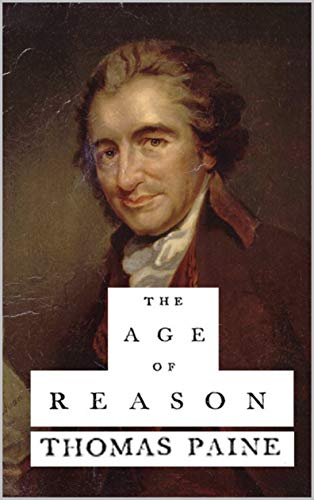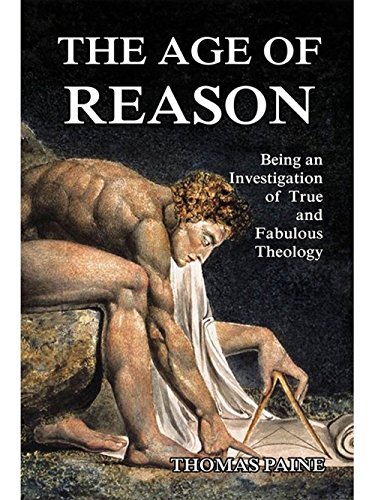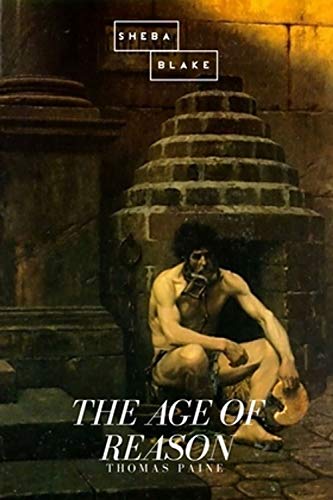-
The Age of Reason
Thomas Paine, The Works of Thomas Paine
language (, July 4, 2008)"The Age of Reason" is an influential work by Thomas Paine that follows in the tradition of eighteenth-century British deism, and challenges institutionalized religion and the legitimacy of the Bible. It presents common deistic arguments; for example, it highlights what Paine saw as corruption of the Christian Church and criticizes its efforts to acquire political power. Paine advocates reason in the place of revelation, leading him to reject miracles and to view the Bible as "an ordinary piece of literature rather than as a divinely inspired text". It promotes natural religion and argues for the existence of a creator-God. The Age of Reason is divided into three sections. In Part I, Paine outlines his major arguments and personal creed. In Parts II and III he analyzes specific portions of the Bible in order to demonstrate that it is not the revealed word of God. Most of Paine's arguments had long been available to the educated elite, but by presenting them in an engaging and irreverent style, he made deism appealing and accessible to a mass audience.Thomas Paine (1737-1809) was an English-American political activist, philosopher, political theorist, and revolutionary. One of the Founding Fathers of the United States, he authored the two most influential pamphlets at the start of the American Revolution, and he inspired the rebels in 1776 to declare independence from Britain. Paine's ideas reflected Enlightenment-era rhetoric of transnational human rights.
-
The Age of Reason
Thomas Paine, The Works of Thomas Paine
language (, July 4, 2008)"The Age of Reason" is an influential work by Thomas Paine that follows in the tradition of eighteenth-century British deism, and challenges institutionalized religion and the legitimacy of the Bible. It presents common deistic arguments; for example, it highlights what Paine saw as corruption of the Christian Church and criticizes its efforts to acquire political power. Paine advocates reason in the place of revelation, leading him to reject miracles and to view the Bible as "an ordinary piece of literature rather than as a divinely inspired text". It promotes natural religion and argues for the existence of a creator-God. The Age of Reason is divided into three sections. In Part I, Paine outlines his major arguments and personal creed. In Parts II and III he analyzes specific portions of the Bible in order to demonstrate that it is not the revealed word of God. Most of Paine's arguments had long been available to the educated elite, but by presenting them in an engaging and irreverent style, he made deism appealing and accessible to a mass audience.Thomas Paine (1737-1809) was an English-American political activist, philosopher, political theorist, and revolutionary. One of the Founding Fathers of the United States, he authored the two most influential pamphlets at the start of the American Revolution, and he inspired the rebels in 1776 to declare independence from Britain. Paine's ideas reflected Enlightenment-era rhetoric of transnational human rights.
-
The Age of Reason
Thomas Paine, The Works of Thomas Paine
language (, July 4, 2008)"The Age of Reason" is an influential work by Thomas Paine that follows in the tradition of eighteenth-century British deism, and challenges institutionalized religion and the legitimacy of the Bible. It presents common deistic arguments; for example, it highlights what Paine saw as corruption of the Christian Church and criticizes its efforts to acquire political power. Paine advocates reason in the place of revelation, leading him to reject miracles and to view the Bible as "an ordinary piece of literature rather than as a divinely inspired text". It promotes natural religion and argues for the existence of a creator-God. The Age of Reason is divided into three sections. In Part I, Paine outlines his major arguments and personal creed. In Parts II and III he analyzes specific portions of the Bible in order to demonstrate that it is not the revealed word of God. Most of Paine's arguments had long been available to the educated elite, but by presenting them in an engaging and irreverent style, he made deism appealing and accessible to a mass audience.Thomas Paine (1737-1809) was an English-American political activist, philosopher, political theorist, and revolutionary. One of the Founding Fathers of the United States, he authored the two most influential pamphlets at the start of the American Revolution, and he inspired the rebels in 1776 to declare independence from Britain. Paine's ideas reflected Enlightenment-era rhetoric of transnational human rights.
-
The Age of Reason
Thomas Paine, The Works of Thomas Paine
language (, July 4, 2008)"The Age of Reason" is an influential work by Thomas Paine that follows in the tradition of eighteenth-century British deism, and challenges institutionalized religion and the legitimacy of the Bible. It presents common deistic arguments; for example, it highlights what Paine saw as corruption of the Christian Church and criticizes its efforts to acquire political power. Paine advocates reason in the place of revelation, leading him to reject miracles and to view the Bible as "an ordinary piece of literature rather than as a divinely inspired text". It promotes natural religion and argues for the existence of a creator-God. The Age of Reason is divided into three sections. In Part I, Paine outlines his major arguments and personal creed. In Parts II and III he analyzes specific portions of the Bible in order to demonstrate that it is not the revealed word of God. Most of Paine's arguments had long been available to the educated elite, but by presenting them in an engaging and irreverent style, he made deism appealing and accessible to a mass audience.Thomas Paine (1737-1809) was an English-American political activist, philosopher, political theorist, and revolutionary. One of the Founding Fathers of the United States, he authored the two most influential pamphlets at the start of the American Revolution, and he inspired the rebels in 1776 to declare independence from Britain. Paine's ideas reflected Enlightenment-era rhetoric of transnational human rights.
-
The Age of Reason
Thomas Paine
eBook (Peacock Publishing, Nov. 3, 2019)The Age of Reason: Being an Investigation of True and Fabulous Theology, a deistic treatise written by eighteenth-century British radical and American revolutionary Thomas Paine, critiques institutionalized religion and challenges the inerrancy of the Bible. Published in three parts in 1794, 1795, and 1807, it was a bestseller in America, where it caused a short-lived deistic revival. British audiences, however, fearing increased political radicalism as a result of the French revolution, received it with more hostility. The Age of Reason presents common deistic arguments; for example, it highlights the corruption of the Christian Church and criticizes its efforts to acquire political power. Paine advocates reason in the place of revelation, leading him to reject miracles and to view the Bible as an ordinary piece of literature rather than as a divinely inspired text. The Age of Reason is not atheistic, but deistic: it promotes natural religion and argues for a creator-God.
-
The Age of Reason
Thomas Paine
eBook (, Dec. 23, 2017)Based on years of study and reflection by the author, this 18th-century work, which was written from the deist point of view, questions Christian beliefs and the role of religion in society.
-
The Age of Reason
Thomas Paine
eBook (, Oct. 23, 2019)The Age of Reason: Being an Investigation of True and Fabulous Theology, a deistic treatise written by eighteenth-century British radical and American revolutionary Thomas Paine, critiques institutionalized religion and challenges the inerrancy of the Bible. Published in three parts in 1794, 1795, and 1807, it was a bestseller in America, where it caused a short-lived deistic revival. British audiences, however, fearing increased political radicalism as a result of the French revolution, received it with more hostility. The Age of Reason presents common deistic arguments; for example, it highlights the corruption of the Christian Church and criticizes its efforts to acquire political power. Paine advocates reason in the place of revelation, leading him to reject miracles and to view the Bible as an ordinary piece of literature rather than as a divinely inspired text. The Age of Reason is not atheistic, but deistic: it promotes natural religion and argues for a creator-God.
-
The Age of Reason
Thomas Paine, The Works of Thomas Paine
eBook (, July 4, 2008)"The Age of Reason" is an influential work by Thomas Paine that follows in the tradition of eighteenth-century British deism, and challenges institutionalized religion and the legitimacy of the Bible. It presents common deistic arguments; for example, it highlights what Paine saw as corruption of the Christian Church and criticizes its efforts to acquire political power. Paine advocates reason in the place of revelation, leading him to reject miracles and to view the Bible as "an ordinary piece of literature rather than as a divinely inspired text". It promotes natural religion and argues for the existence of a creator-God. The Age of Reason is divided into three sections. In Part I, Paine outlines his major arguments and personal creed. In Parts II and III he analyzes specific portions of the Bible in order to demonstrate that it is not the revealed word of God. Most of Paine's arguments had long been available to the educated elite, but by presenting them in an engaging and irreverent style, he made deism appealing and accessible to a mass audience.Thomas Paine (1737-1809) was an English-American political activist, philosopher, political theorist, and revolutionary. One of the Founding Fathers of the United States, he authored the two most influential pamphlets at the start of the American Revolution, and he inspired the rebels in 1776 to declare independence from Britain. Paine's ideas reflected Enlightenment-era rhetoric of transnational human rights.
-
The Age of Reason: Thomas Paine
Thomas Paine
eBook (, Aug. 31, 2019)The Age of Reason is a work by English and American political activist Thomas Paine, arguing for the philosophical position of Deism. It follows in the tradition of eighteenth-century British deism, and challenges institutionalized religion and the legitimacy of the Bible. It was published in three parts in 1794, 1795, and 1807.Paine's book followed in the tradition of early eighteenth-century British deism. These deists, while maintaining individual positions, still shared several sets of assumptions and arguments that Paine articulated in The Age of Reason. The most important position that united the early deists was their call for "free rational inquiry" into all subjects, especially religion. Saying that early Christianity was founded on freedom of conscience, they demanded religious toleration and an end to religious persecution.
-
The Age of Reason
Thomas Paine
eBook (, Oct. 9, 2019)The Age of Reason: Being an Investigation of True and Fabulous Theology, a deistic treatise written by eighteenth-century British radical and American revolutionary Thomas Paine, critiques institutionalized religion and challenges the inerrancy of the Bible. Published in three parts in 1794, 1795, and 1807, it was a bestseller in America, where it caused a short-lived deistic revival. British audiences, however, fearing increased political radicalism as a result of the French revolution, received it with more hostility. The Age of Reason presents common deistic arguments; for example, it highlights the corruption of the Christian Church and criticizes its efforts to acquire political power. Paine advocates reason in the place of revelation, leading him to reject miracles and to view the Bible as an ordinary piece of literature rather than as a divinely inspired text. The Age of Reason is not atheistic, but deistic: it promotes natural religion and argues for a creator-God.
-
The Age of Reason
Thomas Paine
eBook (, Oct. 1, 2019)The Age of Reason: Being an Investigation of True and Fabulous Theology, a deistic treatise written by eighteenth-century British radical and American revolutionary Thomas Paine, critiques institutionalized religion and challenges the inerrancy of the Bible. Published in three parts in 1794, 1795, and 1807, it was a bestseller in America, where it caused a short-lived deistic revival. British audiences, however, fearing increased political radicalism as a result of the French revolution, received it with more hostility. The Age of Reason presents common deistic arguments; for example, it highlights the corruption of the Christian Church and criticizes its efforts to acquire political power. Paine advocates reason in the place of revelation, leading him to reject miracles and to view the Bible as an ordinary piece of literature rather than as a divinely inspired text. The Age of Reason is not atheistic, but deistic: it promotes natural religion and argues for a creator-God.
-
The Age of Reason
Thomas Paine
eBook (, Nov. 4, 2019)The Age of Reason: Being an Investigation of True and Fabulous Theology, a deistic treatise written by eighteenth-century British radical and American revolutionary Thomas Paine, critiques institutionalized religion and challenges the inerrancy of the Bible. Published in three parts in 1794, 1795, and 1807, it was a bestseller in America, where it caused a short-lived deistic revival. British audiences, however, fearing increased political radicalism as a result of the French revolution, received it with more hostility. The Age of Reason presents common deistic arguments; for example, it highlights the corruption of the Christian Church and criticizes its efforts to acquire political power. Paine advocates reason in the place of revelation, leading him to reject miracles and to view the Bible as an ordinary piece of literature rather than as a divinely inspired text. The Age of Reason is not atheistic, but deistic: it promotes natural religion and argues for a creator-God.